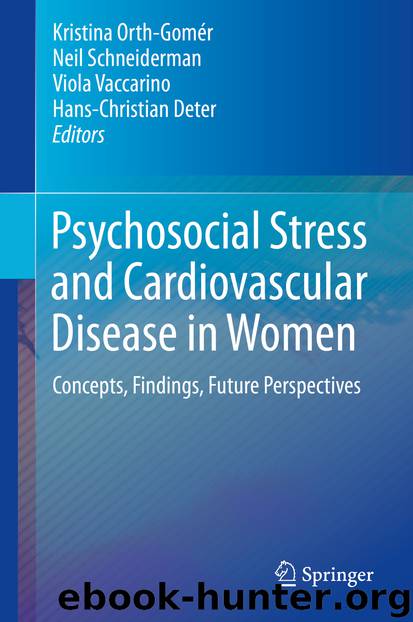Psychosocial Stress and Cardiovascular Disease in Women by Kristina Orth-Gomér Neil Schneiderman Viola Vaccarino & Hans-Christian Deter

Author:Kristina Orth-Gomér, Neil Schneiderman, Viola Vaccarino & Hans-Christian Deter
Language: eng
Format: epub
Publisher: Springer International Publishing, Cham
Concluding Remarks
Women have a later onset of IHD than men, but once IHD is present the prognosis in women is worse than in men. Non-obstructive CAD occurs more often in women compared to men and because of the presence of microvascular disease and endothelial dysfunction in women, the term IHD better reflects ischemic myocardial disease in women than CHD. In addition to these sex differences in underlying coronary and myocardial disease pathophysiology, the symptom profile in women is different than in men, with fatigue, general malaise, and dyspnea more common in women and chest pain more common in men. These two factors (i.e., differences in disease pathophysiology and symptom profiles) have resulted in suboptimal diagnosis and treatment options for women with IHD.
The PNI model of IHD may provide explanations for the observed sex differences in IHD. Inflammation is a potential factor explaining the higher levels of fatigue, malaise, and depressive symptoms in women as inflammation markers are higher in women than men. However, the predictive value of inflammation markers for adverse cardiac health outcomes is less consistent in women than in men. The pattern of depression over the life cycle (e.g., higher prevalence of depression between puberty and menopause) also does not correspond with the prevalence of IHD in women, which is lower during this time period. These observations may be explained by the “protective” role of estrogens in IHD pathophysiology. Fluctuating estrogen levels could affect both depressive symptoms and protect against dyslipidemia, inflammation, and endothelial dysfunction in women in their reproductive years. After the menopausal transition, low circulating estrogen levels may result in a disinhibition of these atherogenic pathways resulting in exaggerated IHD progression. However, estrogen-based hormone treatments have not proven effective in reducing IHD and adverse cardiovascular health outcomes in women. Future studies are therefore needed to optimize risk stratification for incident IHD and IHD-related mortality in women and to develop better biomedical, behavioral, and psychological treatments that are specifically targeted at women.
Download
This site does not store any files on its server. We only index and link to content provided by other sites. Please contact the content providers to delete copyright contents if any and email us, we'll remove relevant links or contents immediately.
Rewire Your Anxious Brain by Catherine M. Pittman(18657)
Talking to Strangers by Malcolm Gladwell(13374)
The Art of Thinking Clearly by Rolf Dobelli(10490)
Mindhunter: Inside the FBI's Elite Serial Crime Unit by John E. Douglas & Mark Olshaker(9345)
Becoming Supernatural by Dr. Joe Dispenza(8222)
Change Your Questions, Change Your Life by Marilee Adams(7786)
Nudge - Improving Decisions about Health, Wealth, and Happiness by Thaler Sunstein(7710)
The Road Less Traveled by M. Scott Peck(7604)
The Lost Art of Listening by Michael P. Nichols(7507)
Mastermind: How to Think Like Sherlock Holmes by Maria Konnikova(7350)
Enlightenment Now: The Case for Reason, Science, Humanism, and Progress by Steven Pinker(7315)
Win Bigly by Scott Adams(7201)
The Way of Zen by Alan W. Watts(6617)
Daring Greatly by Brene Brown(6515)
Big Magic: Creative Living Beyond Fear by Elizabeth Gilbert(5777)
Grit by Angela Duckworth(5616)
Ego Is the Enemy by Ryan Holiday(5452)
Men In Love by Nancy Friday(5242)
The Laws of Human Nature by Robert Greene(5211)
